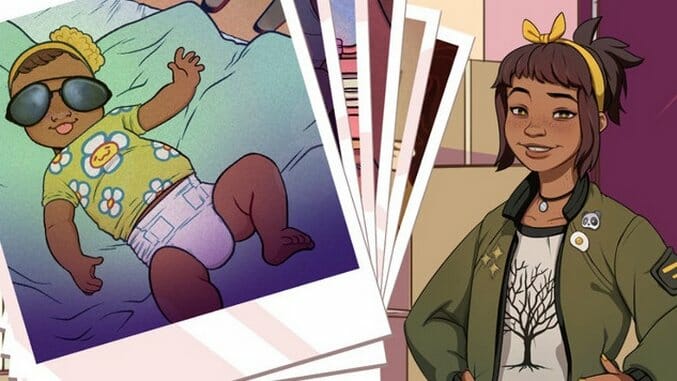On its surface, Dream Daddy is a dating simulator, a point and click adventure through a series of “meet cutes” and awkward dates with men—all of them daddies in a very literal sense—who, were it not for the genuine charm with which they were written, might come across as cliché. Think of a catalog, International Male style, where instead of clothing you order the actual men. That’s the gist of the genre, one that I very much enjoy. But what distinguishes Dream Daddy: A Dad Dating Simulator from games like Coming Out on Top is its focus on the less thirsty parts of your daddy’s life—namely, fatherhood.
On my first playthrough, I cried real, actual tears whenever my daughter Amanda stopped to reassure me that despite being a sloppy, lonely mess, I was a good father. And really, I was. Though I was dating Mat, a coffee shop owner whose taste in music is pretty simpatico with my own, and was tangentially interested in Hugo, a teacher who harbored a secret, shameful love of professional wrestling, it was the relationship between myself and Amanda that pulled me through the game. Every night, checking in with her about my life, Amanda’s developing personhood was becoming increasingly clearer to me, both in-game and in real life. An aspiring photographer hoping to get into art school, Amanda’s life is fraught with teen drama, suffering grades, and the looming knowledge that soon, for the first time in her life, she’ll be away from her dad, who, after her mother/other father’s death, raised her alone.
It’s a simple enough B plot, one you see all the time in teen movies, but Dream Daddy lives and breathes on the player’s ability to read themselves into it, and reader, I did. The good dad/struggling child relationship led me to thinking of my own relationship with my dad, a man who has largely tried to the best of his abilities to be there in the small capacity he’s able, but who really didn’t have the right toolset or parents to do much. Our relationship is incumbent on me calling him, which, to be honest, I don’t do enough because, ultimately, I don’t know how to build a relationship with him, either. I came out as trans two years ago and while he’s gotten a lot better about the reality of the situation, it’s been two years since he looked me in the eye. I’ve been bitter about this for a while—since Dad Jokes, which my dad does not tell, became one of the internet’s chief memes—but playing a game built upon a foundation of Dad Jokes had me thinking about the little things between my father and me that have silently piled up for years, neither of us quite knowing what to do about them.
I think a lot about absent fathers in pop culture, but have rarely been forced to take on the role of a present, concerned parent, in videogames or elsewhere. Frank McQueen, the name I gave to my femme daddy with a John Waters mustache, wasn’t just present—he was lost, watching the girl he knew become vague and distant, trying to figure out how that happened and how to bring her back. Sure, I wanted my character to have sex with Mat, as I suspect everybody who spent a lot of time in college listening to The National’s Boxer did, but I also wanted to be there for Amanda in the way I wished my own dad could be there for me sometimes—a hand on the shoulder, an acknowledgement that he couldn’t possibly understand what I was going through, a well-appreciated though poorly made cake.
And it’s not really my lack of those things that has me hung up on something that is beside the point of the game; it’s that, like the dates themselves, you have to think through what your response to the situation is. You can, in other words, screw up, as dads have been known to do. I’ve been on the other side of the parent/child veil for my entire life, and I don’t see myself becoming a dad or a mother anytime soon, so I’ve never had to think of a child as a distinct, individual human to whom I am bound. Turns out, it’s hard. Turns out, I might need to cut my dad a little slack. That space between what a dad knows and what he can’t possibly predict is long and dark, and nothing lights the way. Maybe I can occupy that space with my dad. Maybe we can get out together.
Colette Arrand is the author of Hold Me Gorilla Monsoon,
. She can be found on Twitter, @colettearrand.